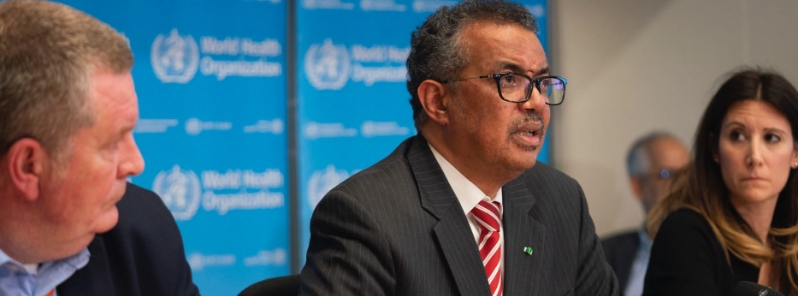WHO declares COVID-19 a global pandemic – expects to see the number of cases, deaths and affected countries climb even higher

The World Health Organization (WHO) has officially declared the COVID-19 outbreak a global pandemic on Wednesday, March 11, 2020. The number of cases has risen dramatically over the past weeks. There are now 124 910 cases and 4 585 deaths worldwide, with Italy and Iran being the worst-hit countries after China.
"WHO is deeply concerned by the alarming levels of the coronavirus spread, severity and inaction, and expects to see the number of cases, deaths and affected countries climb even higher. We have therefore made the assessment that COVID-19 can be characterized as a pandemic," WHO director-general Tedros Adhanom Ghebreyesus announced in a media briefing on March 11, 2020.
WHO defines a pandemic as a global spread of a new disease in which most people are not immune. The coronavirus outbreak began in Wuhan, China in December 2019, and has rapidly swept across countries worldwide in just a matter of three months.
As of March 11, there are 124 910 confirmed cases and 4 585 deaths. China has been the worst-hit, with a total of 80 790 cases and 3 158 fatalities. Coming in second is Italy, with 12 462 cases and 827 deaths. The country has recently imposed a nationwide lockdown amid the alarming sharp increase of infected individuals in the country. The third most affected is Iran, with 9 000 cases and 352 fatalities.
.@WHO is deeply concerned by the alarming levels of the #coronavirus spread, severity & inaction, & expects to see the number of cases, deaths & affected countries climb even higher. Therefore, we made the assessment that #COVID19 can be characterized as a pandemic. https://t.co/97XSmyigME pic.twitter.com/gSqFm947D8
— Tedros Adhanom Ghebreyesus (@DrTedros) March 11, 2020
"In the past two weeks the number of cases outside China has increased thirteenfold and the number of affected countries has tripled," Ghebreyesus said. "In the days and weeks ahead, we expect to see the number of cases, the number of deaths and the number of affected countries to climb even higher."
The chief also remarked that pandemic is not a word that should be used "lightly or carelessly," saying, "t is a word that, if misused, can cause unreasonable fear, or unjustified acceptance that the fight is over, leading to unnecessary suffering and death."
"Describing the situation as a pandemic does not change WHO’s assessment of the threat posed by this coronavirus. It doesn’t change what WHO is doing, and it doesn’t change what countries should do."
"We have never before seen a pandemic sparked by a coronavirus. And we have never before seen a pandemic that can be controlled at the same time. WHO has been in full response mode since we were notified of the first cases," the chief continued.
Ghebreyesus pointed out that the organization called every day for countries to take prompt and aggressive measures, "we have rung the alarm bell loud and clear."
He also reiterated that the number of cases does not show the bigger picture, "as I said on Monday, just looking at the number of COVID-19 cases and the number of countries affected does not tell the full story. Of the 118 000 COVID-19 cases reported globally in 114 countries, more than 90 percent of cases are in just four countries, and two of those– China and South Korea– have significantly declining epidemics."
"81 countries have not reported any COVID-19 cases, and 57 countries have reported 10 cases or less. We cannot say this loudly enough, or clearly enough, or often enough: all countries can still change the course of this pandemic," he stated.
Ghebreyesus urged countries to detect and test their people; treat and isolate the infected; trace, and mobilize officials in the response. Moreover, he emphasized that countries with only a few cases of COVID-19 can prevent it from increasing and from becoming a community transmission.
He highlighted that several countries were able to demonstrate that the outbreak can be contained and controlled. "The challenge for many countries who are now dealing with large COVID-19 clusters or community transmission is not whether they can do the same– it’s whether they will."
On the other hand, he also acknowledged that some countries are struggling with a lack of capability, resources, and ability to resolve. The chief also recognized the efforts being made in the top four countries with the highest number of coronavirus cases.
"We are grateful for the measures being taken in Iran, Italy, and South Korea to slow the virus and control their COVID-19 epidemics. We know that these measures are taking a heavy toll on societies and economies, just as they did in China."
Amidst the pandemic, the chief reminded all countries around the world to prepare their hospitals, protect and train the health workers, and look out for each other. He called on everyone to activate and scale up emergency response, communicate, and educate people about the risks and how to protect themselves.
He also enumerated certain words that according to him are much more actionable: prevention, preparedness, public health, political leadership, and most importantly, people.
Ghebreyesus wrapped his statement up with a hopeful remark, reminding people that "we're in this together, to do the right things with calm and protect the citizens of the world."
Featured image credit: WHO

Can’t wait for WHO and CDC to save us all from the “Pandemic” that was “just the flu” 2 months ago. Stand in line t/get your Covid-19 test since there are so few or none at all!! Remember “Katrina” while people were drowning and dying in the streets with 95 degree heat wave while they did “NOTHING”!!!!!!